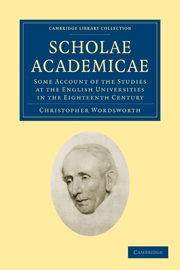 Scholae Academicae
Scholae Academicae Book contents
- Frontmatter
- PREFACE
- Contents
- CHAPTER I GENERAL INTRODUCTION
- CHAPTER II THE TRIPOS, name and thing
- CHAPTER III THE SOPHS' SCHOOLS before 1765
- CHAPTER IV ACTS AND OPPONENCIES after 1772
- CHAPTER V THE SENATE-HOUSE
- CHAPTER VI THE ADMISSION OF QUESTIONISTS. Huddling
- CHAPTER VII THE MATHEMATICKS
- CHAPTER VIII THE TRIVIAL ARTS
- CHAPTER IX HUMANITY
- CHAPTER X MORALS AND CASUISTRY
- CHAPTER XI LAW
- CHAPTER XII MODERN STUDIES
- CHAPTER XIII ORIENTAL STUDIES
- CHAPTER XIV PHYSICK
- CHAPTER XV ANATOMY
- CHAPTER XVI CHEMISTRY
- CHAPTER XVII GEOLOGY AND MINERALOGY
- CHAPTER XVIII BOTANY
- CHAPTER XIX The Degree of M.A.
- CHAPTER XX MUSICK
- CHAPTER XXI ASTRONOMY
- CHAPTER XXII CONCLUSION
- APPENDICES
- INDEX
CHAPTER XI - LAW
Published online by Cambridge University Press: 07 September 2010
- Frontmatter
- PREFACE
- Contents
- CHAPTER I GENERAL INTRODUCTION
- CHAPTER II THE TRIPOS, name and thing
- CHAPTER III THE SOPHS' SCHOOLS before 1765
- CHAPTER IV ACTS AND OPPONENCIES after 1772
- CHAPTER V THE SENATE-HOUSE
- CHAPTER VI THE ADMISSION OF QUESTIONISTS. Huddling
- CHAPTER VII THE MATHEMATICKS
- CHAPTER VIII THE TRIVIAL ARTS
- CHAPTER IX HUMANITY
- CHAPTER X MORALS AND CASUISTRY
- CHAPTER XI LAW
- CHAPTER XII MODERN STUDIES
- CHAPTER XIII ORIENTAL STUDIES
- CHAPTER XIV PHYSICK
- CHAPTER XV ANATOMY
- CHAPTER XVI CHEMISTRY
- CHAPTER XVII GEOLOGY AND MINERALOGY
- CHAPTER XVIII BOTANY
- CHAPTER XIX The Degree of M.A.
- CHAPTER XX MUSICK
- CHAPTER XXI ASTRONOMY
- CHAPTER XXII CONCLUSION
- APPENDICES
- INDEX
Summary
A Serjeant of the Lawe ware and wise,
That often hadde y been at the Parvis.
Chaucer's Prologue.In old times the faculty of Law undertook to teach the jus utrumque, and to give separate degrees in Canon and Civil Law.
The old English Canon Law consisted of the body of legatine and provincial canons, promulgated and adopted in this country, as well as the Roman corpus of Decretals, Clementines and Extravagants collected in the twelfth and three following centuries. The decretum of Gratian of course included Mercator's forged additions to Isidore, on which so much of the pretensions of the See of Rome is founded.
Though there were separate degrees in Canon and Civil law, there was yet a close connexion between the two, so that (as Mr Mullinger shews) when Occam attacked one he aimed a blow at the other. They were connected also in the university course, i.e. a candidate for the doctor's degree was not allowed to enter on Canon law until he had heard lectures in Civil for three years. It is interesting to observe from the information gathered in Mr J. B. Mullinger's early History of Cambridge (1873), how the study of law was from the first little encouraged in the universities; and, as respect for learning and culture increased, the law of the period met with disinterested discouragement.
- Type
- Chapter
- Information
- Scholae AcademicaeSome Account of the Studies at the English Universities in the Eighteenth Century, pp. 135 - 146Publisher: Cambridge University PressPrint publication year: 2009First published in: 1877
